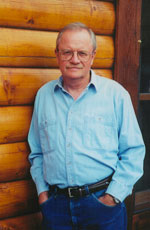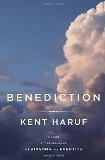Kent Haruf (Turkey 1965-67) Publishes Fifth Novel on Holt, Colorado

Kent Haruf (Turkey 1965-67) is out with the fifth book in his cycle of novels set in the high plains of Colorado. Knopf has just published Benediction, and it is reviewed in the Sunday March 10, 2013, Book Section of The New York Times. Kent’s earlier, best-selling novels about this close-knit community–Holt, Colorado–are The Tie That Binds, Where You Once Belonged, Plainsong and Eventide.
The plot is summed up this way: When Dad Lewis is diagnosed with terminal cancer, he and his wife, Mary, must work together to make his final days as comfortable as possible. Their daughter, Lorraine, hastens back from Denver to help look after him; her devotion softens the bitter absence of their estranged son, Frank, but this cannot be willed away and remains a palpable presence for all three of them. Next door, a young girl named Alice moves in with her grandmother and contends with the painful memories that Dad’s condition stirs up of her own mother’s death. Meanwhile, the town’s newly arrived preacher attempts to mend his strained relationships with his wife and teenaged son, a task that proves all the more challenging when he faces the disdain of his congregation after offering more than they are accustomed to getting on a Sunday morning. And throughout, an elderly widow and her middle-aged daughter do everything they can to ease the pain of their friends and neighbors.
Reviewer Paul Elie in the Times writes, “Ken Haruf’s novels….present slices from life in the fictional town of Holt, Colo., and they defy our expectation that literature rooted in a particular place should show how the place is changing. ….Haruf depicts Holt as a town serenely off the grid. It can be hard to tell in which decade-in which century-the novel take place.”
Haruf won the 1991 Maria Thomas Fiction Award from Peace Corps Writers for his novel Where You Once Belonged.
In 1999, Jeff Martin (Papua New Guinea, 1989-90) who was the Public Affairs Specialist for Peace Corps’ Denver Regional Office, and a freelance writer who had been published in Travel & Leisure, Cineaste, American Cowboy, and the Denver Post, interviewed Kent for our newsletter, Peace Corps Writers & Readers. At the time, Haruf was teaching at Southern Illinois University but soon to retire. Here is the interview, republished below:
Jeff Martin Talking with Kent Haruf
KENT HARUF SERVED in Turkey (1965-67) and is the author of three novels. His novel, The Tie That Binds received a Whiting Foundation Award and a special citation from the PEN/Hemingway Foundation. He is also the author of Where You Once Belonged. Kent’s new novel, Plainsong, has just been published by Knopf and is the “hot” book of the fall ’99 publishing season and was a finalist for this year’s National Book Award in fiction.
I interviewed Haruf in Colorado, the state he was born, raised and will soon retire in, just before a public reading of Plainsong at the Tattered Cover bookstore in Denver. The interview took place in the posh lobby of the Brown Palace Hotel, a sophisticated sanctuary for the elite and world leaders while in town (President Clinton and Mikhail Gorbachev were guests during the G-7 conference in 1997).
Amidst the fast-paced bustle of the business crowd, Haruf, however, seemed to move in three-quarter time. Dressed in casual slacks and plaid shirt with rolled up sleeves, he clearly was in stark contrast to his surroundings. His low-key, understated demeanor is typical of the middle-America he grew up in and the settings for his novels. “That’s the part of the world that is home and where I have the deepest emotional response to. I write very intuitively so I have to depend upon a type of emotional connection, otherwise there is no story.”
Admittedly, his Peace Corps experience may have had some effect on his three daughters: Sorel, a Volunteer in Thailand (1990-92); Whitney, who studied for a year in China and is currently in India with a program called “Friends World;” and Chaney, a senior at the University of Nebraska.
How did you ever cross paths with the Peace Corps?
Like a lot of young people I had a notion of doing some good in the world and seeing as much of it as possible. I ended up in Turkey where I taught English for a middle school in a village called Felahiye.
And your Peace Corps experience was –
– wonderful, an enormously exhilarating experience in so many ways! It basically taught me that, in elemental ways, people are the same all over. It also taught me how to deal with isolation and boredom. I read a lot and that’s when I really began to start writing. A lot of that was journal keeping, but I did write some short stories which weren’t very good. In fact, they were pretty awful.
Has two years in Turkey played any part in your fiction, directly or indirectly?
Not directly. I guess there is an abstract quality of meeting other cultures and the mutual acceptance that occurs, and that does have a bearing on what your interests are, how you write and what you write about.
It has been a long time since you were a Volunteer. Does anything of those years, and that experience, play into your life today?
If you’re asking ‘did it shape who I am today’ – I don’t think so. The Peace Corps simply confirmed the direction I was going in anyway. It did make me less interested in material things and more interested in the qualities of the human spirit. After the Peace Corps you never see yourself as being poor. There, you see real poverty and you can’t feel very sorry for yourself after that.
This novel, and your other two have focused on families and intimate relationships as well as the landscape of small town American life. Do you see this world as disappearing?
Well, I’m not a sociologist so I really can’t comment on the collapse of the American family or anything like that. But I do think that human relationships are always interesting and families are where they are the most intense. At the end of this crazy century I hope that people can focus on what’s important and act out of warmheartedness toward each other even though they are not blood related. Plainsong ends with the characters becoming an extended family with both sides giving something and getting something out of it.
Sounds like a happy ending. Do you like happy endings?
Not especially. Plainsong is more upbeat than my previous novels but there are still prob lems that are not resolved. I don’t believe in happy endings. There used to be a saying about novels, “they usually end in a funeral or a wedding.” This book ends somewhere in between. Realistically, life’s not very tidy and I think this is an actual portrayal of real life.
lems that are not resolved. I don’t believe in happy endings. There used to be a saying about novels, “they usually end in a funeral or a wedding.” This book ends somewhere in between. Realistically, life’s not very tidy and I think this is an actual portrayal of real life.
Your new book has been compared, in its literary quality, to Cold Mountain. Does this sudden attention from the New York literary establishment surprise you?
Yes, in many ways it does. The other books received good critical attention but just didn’t sell well. I’m pleased and surprised that this one does both.
Do you think of your work in any sort of literary tradition, or do you think of yourself as being out on your own in southern Illinois?
I think it fits into the 20th Century literary tradition. But I reject the notion that it’s regional. Simply because a novel is set in, say, Colorado, doesn’t mean it’s western literature. It’d be reductive to say Faulkner was only a southern writer. Of course, I don’t mean to compare myself to Faulkner.
What do you see as the strengths of your writings?
I’d rather someone else say that than me.
What current writers do you read and appreciate?
James Welch and Louise Erdrich, both Native American writers; Richard Ford, Cormac McCarthy, Larry Brown, and Alice Monru. As for the classics, whenever I get the chance, I go back to Faulkner and Hemingway repeatedly.
What about RPCV writers?
The only one I’ve read much of is Bob Shacochis. I’ve met him and we have talked about the Peace Corps.
You’re not into happy endings, so how does it all end for Kent Haruf?
(laughs) Life is very good for me right now. I’m happily married, I have three great daughters and I have another book to write. That’s about as far as I’m going to take it right now.
No comments yet.
Add your comment